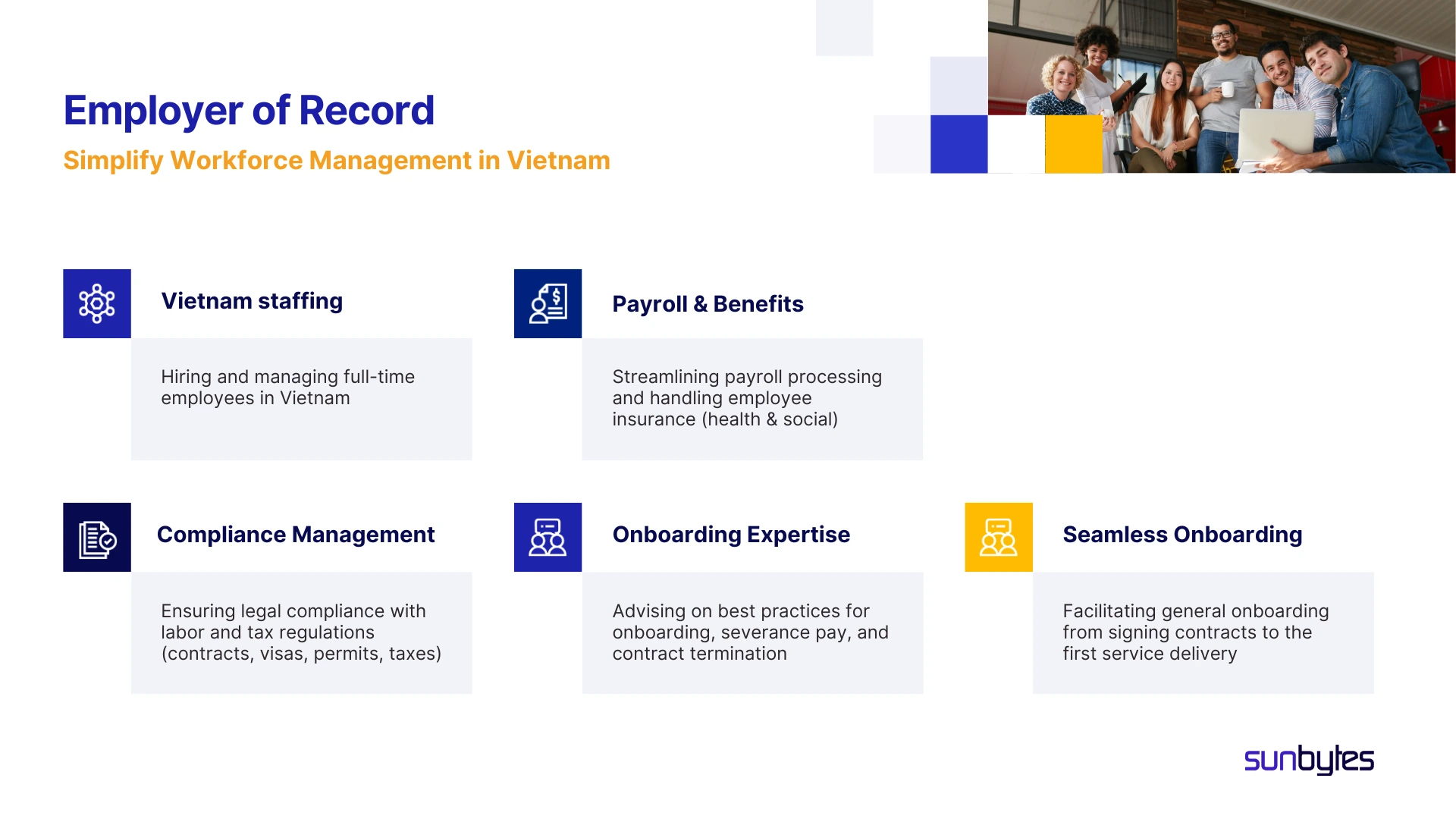Vietnam employer of record has been one of the most effective methods for Dutch businesses that want to expand to this intricate market. Vietnam has become one of Asia’s most attractive destinations for foreign investors, particularly with Dutch businesses looking to expand into Southeast Asia. With a young, skilled workforce (53 million people in 2025), competitive labour costs, and high productivity, the country offers strong potential. Vietnam also has a growing role in global supply chains, with Samsung, Apple, Nike, Adidas, Intel, Ikea, and Walmart often sourcing a majority of their products in Vietnam.
However, expanding into a new market is not without challenges, especially when it comes to recruitment, compliance, and navigating complex local processes. This is where the Employer of Record (EOR) model becomes a strategic entry point, enabling businesses to quickly and compliantly build teams in Vietnam without the delays of establishing a local entity.
Market Potential Meets Complex Barriers
Foreign companies, especially those entering Vietnam for the first time, often face:
- Limited knowledge of local labour laws and HR practices.
- Lengthy and costly procedures to set up a legal entity before hiring.
- Complex compliance requirements covering payroll, social insurance, and work permits.
- Risk of penalties or reputational damage if labour laws are not properly followed.
For fast-moving companies, delays in hiring can mean lost opportunities, stalled projects, or higher operational costs. Without proper local knowledge, even routine HR processes such as drafting compliant contracts, registering for social insurance, or processing foreign work permits can become time-consuming roadblocks.
Additionally, setting up a legal entity involves months of paperwork, high upfront costs, and ongoing compliance obligations. For businesses that want to test the market or hire their first few employees, this can feel like an unnecessary burden.
Dive deeper into the common setup mistakes to avoid when expanding in Vietnam

What is Employer of Record, and Why Would You Use It?
An employer of record (EOR) is a third-party provider that legally employs staff on behalf of a company. The EOR handles payroll, contracts, benefits, social insurance, and compliance with local labour laws. So on paper, the EOR is the official employer, while the client company directs the day-to-day work and pays the third-party provider a fee for this service.
It allows companies to hire someone in a new country without the immediate need to establish a legal entity. Setting up an entity could take several months, while hiring someone through an EOR provider can be done very quickly. Of course, it will take slightly longer when it is a foreigner due to the work permit requirements.
| Legal entity setup in Vietnam | EOR/outsourcing | |
| Set up time | 2-3 months, depending on approvals and industry specifics | Immediate hiring possible |
| Initial Costs | High (registration, licensing, legal, and office expenses) | Low-to-medium, service fee-based |
| Minimum capital/charter capital required | ~USD 10,000-50,000 for service companies, for other types, it will be higher (no fixed legal minimum, but regulators expect this) | Not required |
| Lease office space | ~USD 60+ per m²/month in the centre of HCMC or Hanoi, cheaper outside the center. Fit-out costs extra lease contracts require a 2-3 months deposit, and the duration is usually 2-3 years | EOR often includes coworking space for small teams at marginal cost, avoiding long leases, and working from home is also an option |
| Flexibility | Less flexible, fixed presence in Vietnam | High flexibility, scale teams up or down |
Read more: EOR vs. Entity setup in Viet Nam: 8 Critical Signs for Your Best Decision
What Services Does Vietnam Employer of Record Provide for Dutch Businesses?
If a company acts as the employer of record, it will arrange:
- Employment contracts & legal compliance
- Payroll, taxes, and social security contributions, mandatory benefits (holiday pay, insurance, pensions)
- HR administration (leave, sick days, records)
- Immigration/work permits for foreign hires
- Lawful termination and off-boarding

EOR in the Netherlands vs Vietnam: Key Differences You Need to Know
Foreign businesses often assume that EOR works the same way across countries. While the concept is similar, the legal frameworks and practical applications in the Netherlands and Vietnam differ significantly:
| Category | Country | |
| Netherlands | Vietnam | |
| Applicable laws | The Act on the Allocation of Labour by Intermediaries, the Dutch Civil Code, and Collective Labour Agreements might apply to this service. | The Labour Code 2019 applies. |
| License or registration | Any company supplying labour (either EOR, temp agency or payroll) must be registered with the Dutch Chamber of Commerce under the Act on the Allocation of Labour by Intermediaries, complying with certain requirements. | Only companies with a labour outsourcing licence can legally operate as EORs. |
| Duration | Outsourced employment is phased and typically limited to a maximum of 4 years, after which an indefinite contract must be offered. | Labour contracts can be definite or indefinite, but foreign employees cannot obtain indefinite contracts since their work permits are capped (max. 2 years at a time). |
In short, while the Netherlands has a long-established framework for intermediated labour, Vietnam’s EOR model is more restrictive but extremely effective for foreign businesses that need a compliant way to enter the market quickly.
We Speak Your Language (Literally). Let Us Accompany You on This Journey
For Dutch businesses entering Vietnam, the Employer of Record (EOR) model offers a fast, compliant, and low-risk way to start building teams without the delay and costs of setting up a legal entity and everything connected with running a business. It is especially effective for tech-driven companies that need to access skilled developers and engineers quickly.
For over 10 years, the Dutch-built, Vietnam-rooted heritage at Sunbytes has been at our business’s core, helping foreign businesses navigate compliance, recruit talent, and build high-performing teams in Vietnam. With our expertise, you can start operations in weeks, not months, and expand confidently in a fast-changing market.
👉 Ready to explore Vietnam’s talent market? Contact Sunbytes today and start building your team with ease.
Frequently Asked Questions
Yes, if you use the EOR service, there is no need to set up a legal entity, and you can focus on other things, such as building a team and developing the business.
The costs are between USD 500-800 per month, and the same amount for a one-time setup. For more details, please contact us for a free consultation.
The monthly costs for having a company in Vietnam would be between USD 6,000-10,000, this is on top of the initial setup costs of USD 5,000-10,000.
- Higher cost per employee, because service fees and margins make EOR more expensive than direct employment in the long run. This option is not really scalable, but it is acceptable for first hires or market entry. It is costly and less flexible for larger teams.
- Less control because the employment contracts and payroll are managed by the EOR, not the company itself.
- There will likely be a weaker company-employee relationship because the employee is legally employed by the EOR, which may affect loyalty, benefits, and company culture.
Let’s start with Sunbytes
Let us know your requirements for the team and we will contact you right away.


